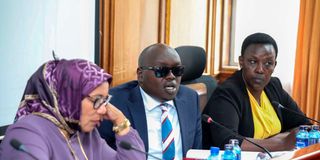MPs push for new law to address child and maternal deaths

Nominated Senator Beatrice Ogolla (right) and other senators at a past event. Ms Ogolla has sponsored the Maternal, Newborn and Child Health Bill 2023.
What you need to know:
- Hospitals will be required to maintain a register for maternal, newborn, and childcare cases, adhering to ethical standards and guidelines.
Members of Parliament are pushing for a new law to improve maternal, newborn and child healthcare services. This is aimed at reducing child and maternal deaths across the country.
The Maternal, Newborn and Child Health Bill 2023, sponsored by nominated Senator Beatrice Ogolla and the National Assembly Health Committee, seeks to guarantee quality care for mothers, newborns and children.
The proposed legislation focuses on pregnant women, newborns, and children up to 12 years of age, providing a framework for accessible and quality healthcare.
It outlines key principles like accessibility and equity to ensure that all women and children, including vulnerable groups, receive adequate care.
“A person seeking maternal, newborn, and child health services in any health care facility is entitled to be treated with courtesy and respect irrespective of their race, marital status, health status, ethnic or social origin, colour, age, disability, religion, conscience, belief, culture, dress, language or birth," reads the Bill in part.
The Bill, currently before the National Assembly Health Committee, also aims to create an integrated approach to healthcare, boosting cooperation between national and county governments, and establishing a funding strategy.
Hospitals will be required to maintain a register for maternal, newborn, and childcare cases, adhering to ethical standards and guidelines.
National and county governments will have distinct roles, with the national government overseeing policy while counties handle local implementation. The Bill will also introduce monitoring mechanisms to identify vulnerable groups and evaluate healthcare service quality.
Senator Ogolla said every expectant mother and newborn deserves adequate healthcare services.
"If the Bill sails through,it will also provide tailored healthcare for vulnerable groups, including the mentally challenged and those living with disabilities," said Ms Ogolla.
This means the law will ensure expectant women with special needs get dignified treatment during and after childbirth.
The Bill comes at a time Kenya has been grappling with rising deaths of mothers and newborns.
For instance; a report by the Auditor General found that more than 1,000 women died during childbirth between 2020 and 2021.
A recent performance audit report by the Auditor General also laid bare the sorry state of maternity hospitals in counties.
The audit conducted in 11 counties sought to assess the status of the provision of maternal and newborn health care services in public hospitals.
The audit was conducted in Nairobi,Mombasa,Kisumu,Nakuru,Bungoma,Taita Taveta ,West Pokot,Makueni,Siaya,Isiolo and Garissa.
A total of 67 public health facilities in the selected counties were sampled for the audit; among them six level five hospitals, 26 level four hospitals, 22 level three and 13 level two facilities.
The audit that covered a period of five financial years, from 2017/2018 to 2021/2022, painted a grim picture of the maternity facilities, indicating that over 60 per cent of the facilities are ill equipped to offer basic maternity services.
From inadequate essential equipment to lack of trained health care workers, neonates sharing incubators and more than three mothers sharing a bed, the report revealed the sorry state of maternity facilities in counties.
The audit also examined the operations of the Ministry of Health, county governments and public health facilities in the provision of maternal and neonatal healthcare services in the devolved units.
The audit revealed that between 2017 and 2022, the number of maternal mortalities has been increasing, something attributed to the poor state of the health facilities that provide healthcare to mother's and newborn babies and the poor quality services offered.
For instance, the audit report showed that 409 mothers died in 2017 ,421 in 2018,459 in 2019 and 1,053 between 2020 and 2021 (at the height of Covid-19 in the country).
The number of newborn babies between age zero and 28 days who died increased between 2017 and 2019, before dropping slightly.
In 2017 alone, 3,579 newborn babies died, in 2018 (4,685) ,in 2019 (4,906), 2020 (4,426) and 4,307 in 2021.


